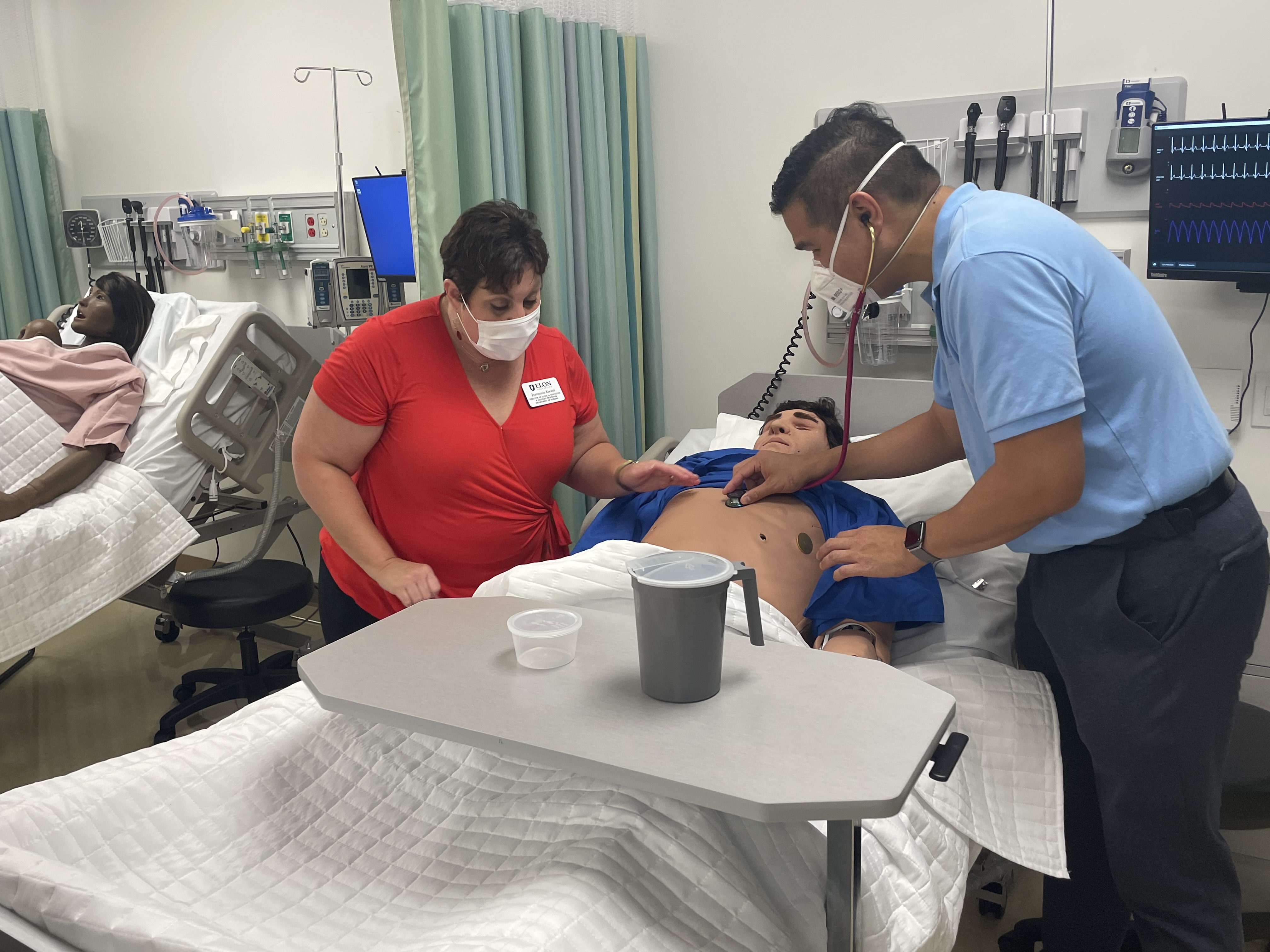The Golden LEAF Foundation has awarded a one-year, $100,000 grant to Elon University for the establishment and equipping of an augmented, virtual and mixed reality suite in the Francis Center.
The Golden LEAF Foundation recently offered its support to Elon University’s efforts to ensure its health sciences students stay on the cutting edge and are exposed to the latest advances in health care.
The foundation has awarded a one-year, $100,000 grant to Elon for the establishment and equipping of an augmented, virtual and mixed reality suite in the Gerald L. Francis Center, home of the School of Health Sciences.
“The augmented, virtual and mixed reality suite will allow students to be immersed and engage in health care scenarios in a virtual world,” said Becky Neiduski, dean of the School of Health Sciences. “The Enklu software funded by the Golden Leaf grant will help us create that virtual world.”

The project looks to create an interprofessional lab equipped with augmented reality (AR), virtual reality (VR) and mixed reality (MR) technology. The suite will be on the first floor of the Francis Center and is a part of the next phase of renovations which began the week of Oct. 18.
The AR/VR/MR suite will be separate from the Interprofessional Simulation Center, which is on the second floor of the Francis Center.
“We hope to have the AR/VR/MR suite up and running by mid-spring,” Neiduski said. “We will establish a start date with Golden LEAF and begin working on equipment and software acquisition, training, and implementation within the next 12 months.”
The use of AR/VR/MR simulation opens the door to a new world in the education of health care practitioners. Augmented reality allows for the projection of 3D images in the current space, while virtual reality includes creating entirely simulated environments for user interactions. Mixed reality combines the two, allowing users to interact with digital objects and the physical world around them.
Instructors can develop complete scenarios in low-stake environments for students to practice and grow confidence and skill in high-pressure situations. The lab will also be a space for health care providers in the local community to continue their education, thus strengthening the quality of care in the region. In the 12-county Triad region, three counties (Caswell, Randolph and Rockingham) have been designated as highly distressed and the remaining nine as moderately distressed by the 2021 North Carolina Development Tier Designations.
The new facility will be able to accommodate the planned growth of the School of Health Sciences in the coming years as Elon’s new nursing programs expand.

“The AR/VR/MR suite will support every student in the School of Health Sciences. Right now, that number is almost 300. By the fall of 2025, that will be over 600. The suite is also intended to serve our communities,” Neiduski said. “Physical therapists, physician assistants, nurses, any type of health care provider – we can build continuing education courses and experiences for them using this great new technology.”
The suite will be an open space equipped with state-of-the-art technology, including VR headwear, creating a flexible learning environment for students to move freely and without obstacles.
Melissa Murfin, who wears many hats including research coordinator and director of curriculum and instruction for the Department of Physician Assistant Studies and director of educational strategies for School of Health Sciences, said the software opens the door to countless possibilities of medical scenarios. The number of medical professionals learning through simulated training is growing, and the soon-to-be AR/VR/MR suite will place Elon health sciences students ahead of the curve in such training.
“Enklu will build one scenario for us, then we’ll have the opportunity to build our own,” Murfin said. “We will engage in faculty and staff development to figure out our own scenarios and then help to train other faculty and staff to be able to develop their own scenarios.”
Chris Esters, director of corporate and foundation relations, said the process of applying for the grant and receiving approval from Golden LEAF went smoothly and took only a few months. The opportunity with Golden LEAF was a “perfect intersection” of what the foundation has supported in the past and what Elon has planned for the future.
Elon’s newly established nursing program has made clear its intentions to graduate nurses committed to health equity and focused on care for diverse populations. Funding for the AR/VR/MR suite will help the Department of Nursing achieve that goal.
“While Golden LEAF is funding a particular part of the suite, they are interested in the outcome of the program,” Esters said. “They want to know that the education complemented by the AR/VR/MR simulation suite results in graduating nurses who will impact healthcare in our local communities.”
The implementation of the suite has several goals which include creating more nurses in economically distressed communities, creating a library of AR/VR/MR simulations and increasing innovation opportunities within continuing education courses. But above all, it aims to produce more well-rounded health care professionals.
“We are committed to helping students think about the spaces and places where they will interact with people from marginalized and underserved communities,” Neiduski said. “Our goal is to prepare healthcare providers who think broadly about participation; how history, community, and the environment impact a person’s ability to participate both in healthcare and in their pursuit of a healthy and fulfilling life.”



